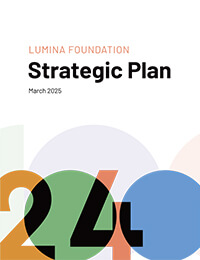Seventeen years ago, Lumina Foundation set an ambitious goal: By 2025, 60 percent of working-age adults in the United States would have a degree, certificate, or industry-recognized certification. At the time, only 38 percent had one. Today, that number has risen to 55 percent, thanks to the dedication of students, educators, and policymakers who believe in the power of education and training beyond high school.
Now, higher education faces new challenges. Rising costs, doubts about job opportunities, and the influence of artificial intelligence have caused people to question whether a college degree is worth it. We must rethink how education creates opportunities and drives success for individuals and communities.
That’s why Lumina has set a new goal: By 2040, 75 percent of adults in the U.S. labor force will have college degrees or other credentials of value leading to economic prosperity. This vision ensures education remains affordable, accessible, and relevant in an evolving world.
Why this goal matters
Higher education has always helped people find good jobs, earn more money, and strengthen communities. When more people have degrees and certifications, businesses grow, local economies improve, and democracy thrives.
Yet confidence in higher education is declining. In 2015, 57 percent of Americans had high confidence in colleges and universities. Today, that number is just 36 percent. Many feel that college is too expensive or does not deliver on its promise. To change this, we must ensure that every degree and credential benefits students and society.
Our priorities
To reach the 2040 goal, Lumina will focus on four main areas:
- Ensuring Credentials Have Value – Students pursue higher education to improve their lives. Their degrees and certifications must lead to real benefits, such as higher wages and career growth. We need stronger connections between academic programs and job opportunities while ensuring students develop critical thinking skills.
- Expanding Access to Education – Higher education should be available to all, but many face barriers such as high costs and complex admissions processes. This is especially true for students from low-income backgrounds, rural communities, and communities of color. We must simplify access so that everyone has a fair shot at succeeding.
- Helping Students Graduate – Enrolling in college is just the first step. Students also need support to graduate. Many struggle with financial difficulties, family responsibilities, and mental health challenges. The education system must modernize to support today’s students, helping them stay on track and finish their programs.
- Redesigning Education for the Future – Making changes around the margins won’t be enough. We must fundamentally rethink how colleges, universities, and state systems operate to meet today’s needs. This includes making education more affordable, improving financial aid, and ensuring schools clearly provide value to students and communities.
Why it’s urgent
By 2031, 72 percent of U.S. jobs will require some form of higher education or training. If we don’t help more people gain the right skills and credentials, millions will struggle to find good jobs, and our economy will suffer.
Higher education is also essential to reducing inequality. Since 2010, increased education levels have contributed more than $14.2 trillion in lifetime earnings across the United States. To build a fairer society, we must ensure that all people—regardless of background—have access to higher education and its benefits.
Working together for change
Lumina cannot do this alone. We call on colleges and universities to focus on affordability and student success. We urge employers to invest in training and education programs for their employees. And we encourage students and families to advocate for an education system that truly serves them.
The increase in the number of Americans with college degrees and other credentials beyond a high school diploma since 2008 has been one of the most significant yet least recognized success stories of the past two decades.
As we move forward, Lumina remains committed to leading the way. We will continue investing in innovative programs, partnering with leaders, and driving policy improvements to ensure more Americans achieve their education and career goals.
Together, we can create a future where higher education is accessible, valuable, and life-changing for all. The future of our workforce—and our nation—depends on it.
Jamie Merisotis is president and CEO of Lumina Foundation, an independent, private foundation in Indianapolis committed to making opportunities for learning beyond high school available to all.


